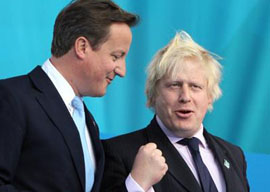
March 17, 2013

David Cameron and Boris Johnson
No matter what a person has done, British newspapers manage to crowbar in the name of Eton to any article concerning a former pupil. (A Daily Mail review of my book on bullfighting was headlined “Etonian matador who triumphs in the bullring“ as though the school ran classes in the subject.)
The fifteen OE prime ministers who ruled before World War I lived in a completely different world, one where a PM was ruling a largely likeminded electorate of less than half a million people before the 19th century’s reform bills brought wider emancipation. Despite massive changes in the outside world, within the “bubble of Westminster” it can all feel like Gladstone (another OE) is still at the helm. This is especially true in the Conservative Party, whose right wing made the mistake of putting their faith in Cameron’s background, while the left was aware that he was really one of them, having bought the dogma that modernization and welfare statism were the only ways to power.
With New Labour a busted flush economically after 13 years in power, it was clearly “time for a change,” and how could this smooth and affable chap with his photogenic young family not be the face of that change? Traditional Tory voters would have no choice at the ballot box, while those who”d voted for Blair would see “Dave” as more of an heir to “Tony” than the dour Scotsman Gordon Brown.
The first clue that this narrative was wrong and that having a cabal of OEs around you might blind you to just how much the electorate might dislike, or at least mistrust, inherited privilege was when the Conservatives failed to achieve a majority at the 2010 election.
They failed to take the hint and instead decided to maintain the apparently contradictory course of trying to institute vitally necessary but historically large cuts to the welfare state while pretending to be massively in favor of it. This has led to absurdities such as excluding the possibility of touching one of the largest and most bloated parts of the welfare system, the National Health Service.
All that has really been achieved by this posturing has been to delay cuts so they come in dribs and drabs rather than all at once at the beginning when they might have had some effect and been forgotten by the next election. Thus, the left of the electorate has been even more alienated than necessary, while the right has been lost by the failure to cut deeply enough.
The two worst things have been tangibly “OE” effects, though.
The first is that the cuts have been made by men who are not only themselves unaffected, but whose families have not needed the welfare state for a very, very long time”if ever. Margaret Thatcher’s father was a pharmacist from a small town and she attended a state-funded school (and notably fired most of the OEs from her cabinet in “83). There is a marked difference between her telling the public they had to tighten their state-funded belts and the 14th Earl of Home”Alex Douglas-Home’s full title”doing so.
The second is that in a piece of arrogance which I can only imagine coming from a former schoolmate, Cameron tried to rectify that image problem by passing a piece of massively important social legislation, gay marriage. It not only was not in his manifesto”and thus was not voted for by the public”but he knew the majority of his own MPs would vote against it. By using opposition MPs to get this legislation through, he defied the democratic will of the people’s representatives who gave him power.
There is a direct connection between this haughty disdain for democracy and the school at the historic heart of the ruling class. (My only friend from school who sits in Number 10’s policy unit is also gay, as are many members of Cameron’s inner circle.)
So as we approach the election which will see the Conservative Party fall, I think this is one battle that has been lost on playing-fields of Eton. Perhaps what would be good for both the country and the party would be another term out of power. It would allow the country to realize how badly off they really are and whom they might need to lead them out of it. However, while Old Etonians will continue to be a strong influence in the Conservative Party, they should be forever barred from running it.